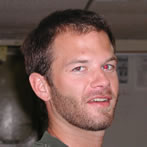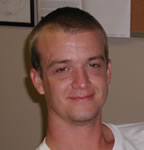| OCULINA Coral Banks |
Daily
At Sea Log |
Oct. 23, 2002 |  |
|
|
By: Rachel McEvers, Project
Oceanica
You have seen many images that surround Marine Protected areas; the habitat, the inhabitants be they coral, fish or invertebrates, and the destruction of places that are neglected. So instead here are two individuals from the research team who have worked hard to protect the Oculina Banks. Thank you, Bobby and  Morgan. Morgan.
 (Bobby, pictured left, and Morgan, pictured right, can be found doing their part along Wrightsville Beach N.C.) There are thousands of national and state parks on land along the eastern seaboard of the U.S. In addition, hundreds more estuarine and coastal areas are set aside to preserve habitats and inhabitants. However, in the federal ocean waters from Miami to Cape Hatteras, there is just one protected “national park”—the Oculina Habitat Area of Particular Concern. We take for granted that wildlife refuges are necessary in the face of human development. We enjoy parks as places to go see, hear and touch nature. So why are we so far behind in establishing ocean reserves? I suspect there are several reasons. We cannot be one with nature—bring the kids, pitch a tent, fill the scrapbook-- in a marine park that is 20 miles offshore and 300 feet deep. The oceans have been open by tradition—and some people may feel that closing fishing grounds is a violation of citizen’s rights. We would think twice about filling and paving the Everglades, clear-cutting Yosemite, or fur trapping in Central Park? Yet, we do these types of things to ocean wilderness. Like many ocean areas, fish stocks are over-fished in the OHAPC and their habitat is in trouble. We have tried as a nation to save fish using seasonal closures, gear restrictions, or limited entry; tried and failed. The nation is far behind other nations of the world in using Marine Protected Areas (MPAs) to conserve environments and sustain fishing. In a recent study of 76 reserves around the world, fish densities increased 69%, average body size increased 88%, and biomass 92%. We are even behind ourselves in employing a proven fish management technique. Not far from the OHAPC, the oldest marine reserve in the United States went into place inadvertently at Cape Canaveral in 1962, when the federal government banned boats from waters near Kennedy Space Center. Years later, studies found dramatic increases in the size and abundance of black drum, red drum, snook, spotted sea trout and other fish in the 40-square-mile zone. Fishermen have since made a living fishing the edges of the closed area, catching the large fish that ventured out. So, the OHAPC gives us the chance to prove that MPAs help and don’t hurt our fishing industry. This chance, however, is threatened by a few short-sighted poachers, and the remoteness of the OHAPC. Surveillance and enforcement is difficult. The reefs are hard to get to and study. We need the science to assess recovery of crushed coral beds and declining fish stocks. And, closure does no good without strict enforcement and strong penalties for poachers that could inadvertently crush the last remaining living coral stands of old growth Oculina. If you were hiking through a national park, and spotted someone cuttingdown an old-growth forest, would you report it? If you see a vessel bottom fishing or trawling within the Oculina reserve, please, do the same. It will take education and self-regulation to protect the future of these unique, irreplaceable reefs for our children's generations.
The Chief Mate is responsible for everything from purchasing to crew training schedules. Some of Bren's duties include arranging inspection for all equipment (e.g.lifeboats and fire extinguishers), overseeing the ship's budget (for fuel, food, toilet paper, etc.), work schedules, making sure crew certifications are up to date, scheduling maintenance of equipment and preparing paperwork for technical maintenance just to name a few!! The Chief Mate is responsible for quite a bit and does receive some help from the second mate. He likes the fact that eventhough he gets to work on a ship and go offshore, he gets to go home each night (when not on a mission of course). What he likes least is that the ship's crew must follow the rules of USA (United Space Alliance) that were written to pertain to land employees and sometimes they don't really pertain to employees on a ship. However, he says that's a minor thing and he really likes his job. If given a chance to be a fish, Bren would be a yellowfin tuna. When they feed they round a school of fish into a ball called a "bait ball". Then they put on a real show, jumping out of the water and charging through the ball. He thinks that looks fun!
|
| Ph. 843-953-7263 |
Project Oceanica Lowcountry Hall of Science and Math College of Charleston Charleston, SC 29424 |
Fax 843-953-7850 |